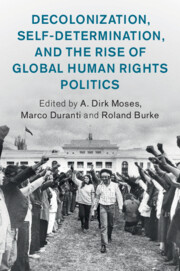13 results
Human Rights at the Edges of Late Imperial Britain: The Tyrer Case and Judicial Corporal Punishment from the Isle of Man to Montserrat, 1972–1990
-
- Journal:
- Law and History Review , First View
- Published online by Cambridge University Press:
- 03 November 2023, pp. 1-24
-
- Article
-
- You have access
- Open access
- HTML
- Export citation
THE MEANING OF THE WAVE IN THE FINAL SCENE OF EURIPIDES’ IPHIGENIA TAURICA
-
- Journal:
- Greece & Rome / Volume 69 / Issue 2 / October 2022
- Published online by Cambridge University Press:
- 06 September 2022, pp. 179-202
- Print publication:
- October 2022
-
- Article
-
- You have access
- Open access
- HTML
- Export citation
Part I - Anti-Colonial Struggles and the Right to Self-Determination
-
- Book:
- Decolonization, Self-Determination, and the Rise of Global Human Rights Politics
- Published online:
- 24 June 2020
- Print publication:
- 16 July 2020, pp 33-150
-
- Chapter
- Export citation
Contents
-
- Book:
- Decolonization, Self-Determination, and the Rise of Global Human Rights Politics
- Published online:
- 24 June 2020
- Print publication:
- 16 July 2020, pp v-vii
-
- Chapter
- Export citation
Notes on Contributors
-
- Book:
- Decolonization, Self-Determination, and the Rise of Global Human Rights Politics
- Published online:
- 24 June 2020
- Print publication:
- 16 July 2020, pp viii-xi
-
- Chapter
- Export citation
Copyright page
-
- Book:
- Decolonization, Self-Determination, and the Rise of Global Human Rights Politics
- Published online:
- 24 June 2020
- Print publication:
- 16 July 2020, pp iv-iv
-
- Chapter
- Export citation
Part II - Postcolonial Statehood and Global Human Rights Norms
-
- Book:
- Decolonization, Self-Determination, and the Rise of Global Human Rights Politics
- Published online:
- 24 June 2020
- Print publication:
- 16 July 2020, pp 151-282
-
- Chapter
- Export citation
Index
-
- Book:
- Decolonization, Self-Determination, and the Rise of Global Human Rights Politics
- Published online:
- 24 June 2020
- Print publication:
- 16 July 2020, pp 425-436
-
- Chapter
- Export citation
Acknowledgments
-
- Book:
- Decolonization, Self-Determination, and the Rise of Global Human Rights Politics
- Published online:
- 24 June 2020
- Print publication:
- 16 July 2020, pp xii-xii
-
- Chapter
- Export citation
2 - Decolonizing the United Nations
- from Part I - Anti-Colonial Struggles and the Right to Self-Determination
-
-
- Book:
- Decolonization, Self-Determination, and the Rise of Global Human Rights Politics
- Published online:
- 24 June 2020
- Print publication:
- 16 July 2020, pp 54-78
-
- Chapter
- Export citation
Part III - Colonial and Neocolonial Responses
-
- Book:
- Decolonization, Self-Determination, and the Rise of Global Human Rights Politics
- Published online:
- 24 June 2020
- Print publication:
- 16 July 2020, pp 283-424
-
- Chapter
- Export citation
Introduction
-
-
- Book:
- Decolonization, Self-Determination, and the Rise of Global Human Rights Politics
- Published online:
- 24 June 2020
- Print publication:
- 16 July 2020, pp 1-32
-
- Chapter
-
- You have access
- HTML
- Export citation

Decolonization, Self-Determination, and the Rise of Global Human Rights Politics
-
- Published online:
- 24 June 2020
- Print publication:
- 16 July 2020



